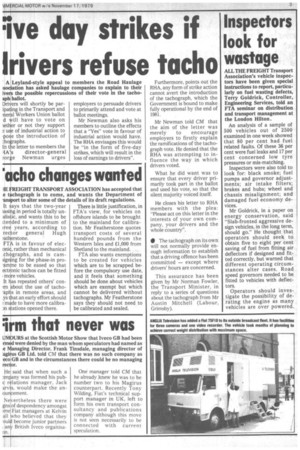ve day strikes if !rivers refuse Who
Page 5

If you've noticed an error in this article please click here to report it so we can fix it.
A Leyland-style appeal to members the Road Haulage ;soaation has asked haulage companies to explain to their ivers the possible repercussions of their vote in the tachoaph ballot.
Drivers will shortly be paripating in the Transport and .neral Workers Union ballot ill have to vote on iet er or not they support u e of industrial action to po e the introduction of -2.ho raphs.
In t e letter to members the -IA • director-general ft:Jr e Newman urges employers to persuade drivers to primarily attend and vote at ballot meetings.
Mr Newman also asks his members to outline the effects that a "Yes" vote in favour of industrial action would have. The RHA envisages this would be "in the form of five-day strikes, which will result in the loss of earnings to drivers". Furthermore, points out the RHA, any form of strike action cannot avert the introduction of the tachograph, which the Government is bound to make fully operational by the end of 1981.
Mr Newman told CM that the aim of the letter was merely to encourage employers to firstly explain the ramifications of the tachograph vote. He denied that the RHA was attempting to influence the way in which drivers voted.
What he did want was to ensure that every driver primarily took part in the ballot and used his vote, so that the silent majority voiced itself.
He closes his letter to RHA members with the plea: "Please act on this letter in the interests of your own company, your drivers and the whole country".
• The tachograph on its own will not normally provide enough information to establish that a driving offence has been committed — except where drivers' hours are concerned.
This assurance has been given by Mr Norman Fowler, the Transport Minister, in reply to a series of questions about the tachograph from Mr Austin Mitchell (Labour, Grimsby).




























































































































































